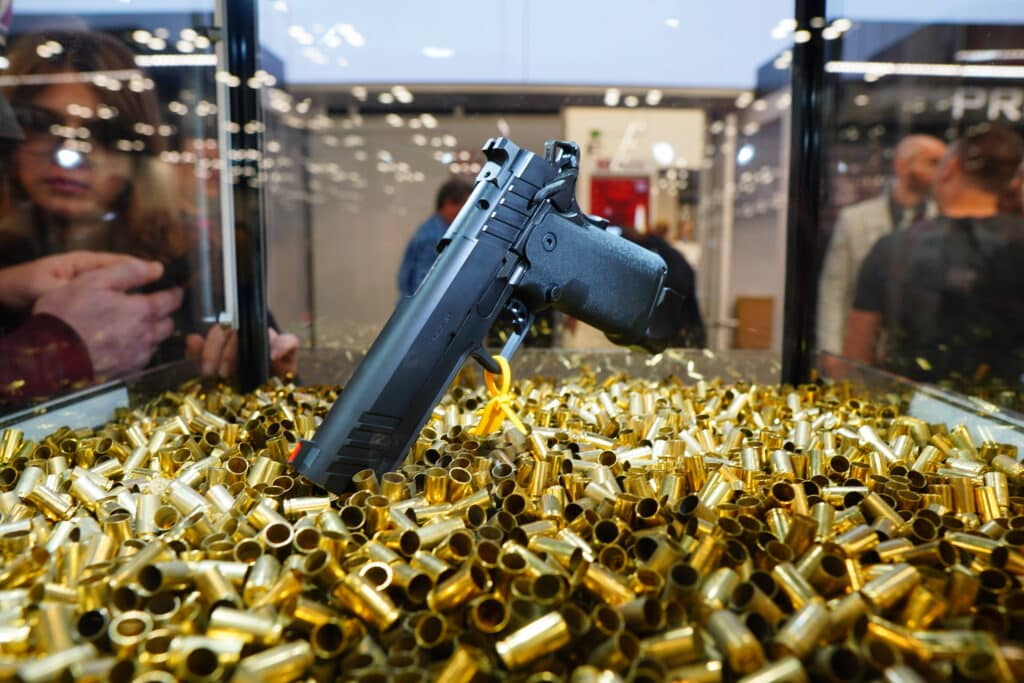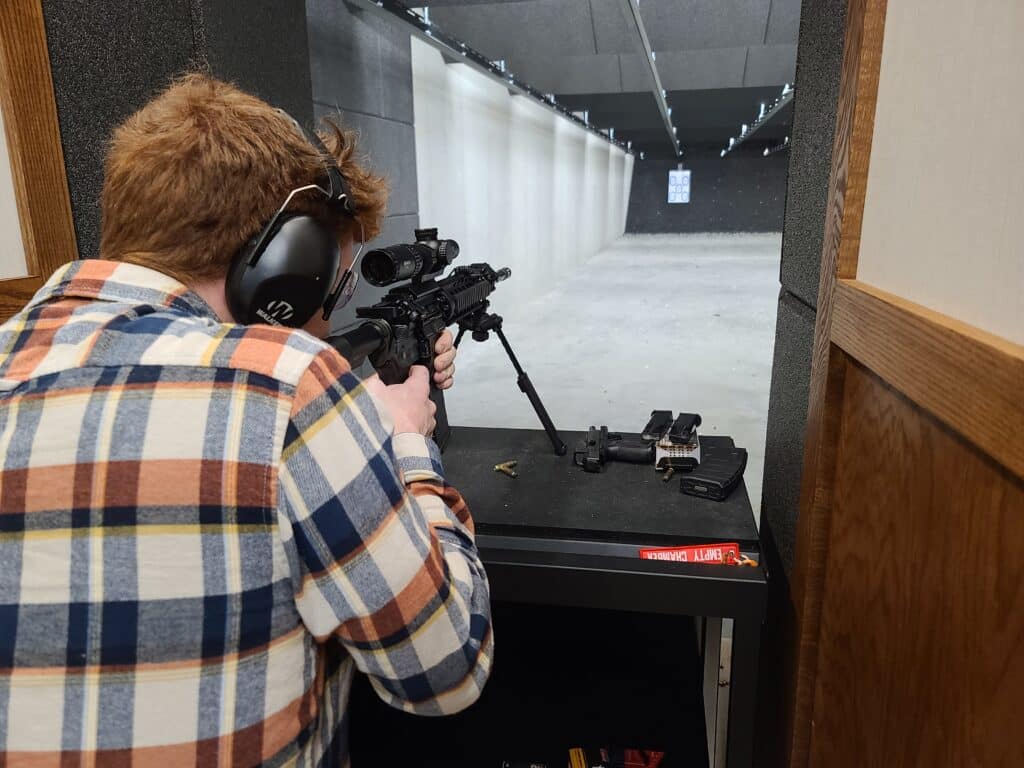President Biden’s entire gun agenda was cast under a new shadow this week thanks to a ruling against former president Trump’s bump stock ban.
Another federal appeals court ruled the bump stock ban was too confusing to enforce, in large part because the ATF had flip-flopped on enforcement. Well, the “ghost gun” and pistol brace bans have the exact same weakness. All three were implemented through the same rulemaking process and all three feature the ATF changing its mind on the legality of the parts in question after years (or even decades) of saying the opposite.
Tennessee is the most interesting state to watch on gun policy at the moment. Its Republican governor is trying to get a “red flag” proposal passed, but one that addresses several of the common critiques of the policy. I examine where the effort is headed for Reload Members.
Washington was another state making significant gun policy moves. It enacted a so-called assault weapons ban. Just as it did that, a new poll shows Americans continue to sour on the idea.
Indiana saw a significant ruling handed down on what protections, if any, the Second Amendment provides convicted felons. It also hosted the recent NRA Annual Meeting where the group’s internal fight effectively came to an end. I explain who won and why.
Plus, former NRA board member Frank Tait on his failed internal reform efforts.

Bump Stock Ban Dealt Another Blow By Federal Appeals Court
By Jake Fogleman
The bump stock ban is too ambiguous to stand, according to a new court order.
On Tuesday, a three-judge panel for the Sixth Circuit Court of Appeals ruled in favor of a Kentucky man who challenged the legality of the ATF’s administrative ban on bump stocks. The unanimous panel ruled that it is unclear whether bump stocks fit within the current statutory definition of “machinegun” because of the agency’s flip-flopping on the issue. Therefore, it found that the definition should be interpreted to exclude them.
“An Act of Congress could clear up the ambiguities, but so far Congress has failed to act,” Judge Ronald Lee Gilman, a Bill Clinton appointee, wrote on behalf of the court. “Because the relevant statutory scheme does not clearly and unambiguously prohibit bump stocks, we are bound to construe the statute in Hardin’s favor.”

Analysis: Will Tennessee GOP Governor’s Red Flag Proposal Change the Debate? [Member Exclusive]
By Stephen Gutowski
The Volunteer State is the place to watch for the country’s most interesting gun law debate right now.
As gun policy moves forward along preestablished partisan lines in red and blue states, Tennessee is the one place where a policy outside those lines has some chance of passing. Republican Governor Bill Lee, motivated by last month’s Nashville school shooting, is pushing the Republican-controlled legislature to pass a modified “red flag” law, which he has relabeled an “order of protection” law. But, unlike many previous proposals, Lee appears to be working to address common critiques levied against the temporary gun confiscation orders.
“Throughout the last couple of weeks, I have worked with members of the General Assembly – constitutionally minded, second amendment protecting members – to craft legislation for an improved Order of Protection Law that will strengthen the safety and preserve the rights of Tennesseans,” Lee said last week. “We all agree that dangerous, unstable individuals who intend to harm themselves or others should not have access to weapons. And that should be done in a way that requires due process and a high burden of proof, supports law enforcement and punishes false reporting, enhances mental health support, and preserves the Second Amendment for law-abiding citizens.”
Since gaining prominence as a possible solution for mass shootings in the wake of the 2018 Parkland shooting, “red flag” laws have been dogged by complaints that they don’t offer sufficient protections for the rights of those accused of being a threat to themselves or others.
If you’re a Reload Member, click here to read more. If not, buy a membership today for exclusive access!

Poll: Support for AR-15 Bans Continues to Drop, Most Opposed
By Stephen Gutowski
Americans are less interested than ever in imposing an “assault weapons” ban.
Those are the results of a Monmouth University poll released on Monday. That poll found 49 percent of Americans opposed a ban on the sale of assault weapons while 46 percent supported one, and six percent were unsure. That marks a nine-point decline in support and a seven-point increase in opposition since Monmouth asked the same question in June 2022.
“Despite continued incidents of mass shootings, public support for banning assault weapons has dipped,” Patrick Murray, director of the independent Monmouth University Polling Institute, said in a press release.
Click here to continue reading.

Federal Judge Rules Felons Aren’t Protected by Second Amendment
By Stephen Gutowski
Convicted felons do not have gun rights, according to a new federal ruling.
Judge Holly A. Brady, who President Donald Trump appointed to the United States District Court for the Northern District of Indiana in 2019, denied a request last week to have a felon’s gun possession charge tossed on constitutional grounds. She found the Second Amendment does not protect Detric L. Cummings’, a convicted felon, ability to own a firearm. She further ruled that barring felons from owning guns is consistent with historical gun restrictions.
“The long list of colonial laws excluding felons from possessing firearms either shows that he is excluded from the protections of the Second Amendment or that § 922(g)(1) is consistent with the Nation’s historical tradition of firearm regulation,” Judge Brady wrote in United States v. Cummings. “Either is enough to defeat Defendant’s motion.”
The ruling is another example of how little success convicted felons have had in asserting protections under the Second Amendment, even in the wake of last year’s landmark New York State Rifle and Pistol Association v. Bruen. Despite the doubt cast on many modern gun restrictions by Bruen’s new standard for deciding gun cases, felons have had little success convincing courts that the Second Amendment forstalls prohibitions on their ability to own guns. In fact, Pepperdine University Professor Jake Charles recently released a report that found there hasn’t been a single successful Second Amendment claim brought against the federal law barring possession of firearms by convicted felons.
Podcast: Former NRA Board Member Frank Tait on Reform Efforts
By Stephen Gutowski
The NRA’s 2023 Annual Meeting was last week. The group was resurgent, and leadership got a mostly warm welcome.
That doesn’t mean the NRA’s problems are solved. To the contrary, it still seems to be bleeding membership revenue at the same time it racks up increasing legal bills from dealing with multiple corruption suits over allegations of financial impropriety. That’s why we have Frank Tait, who just finished his term on the NRA board, on the show this week.
Plus, Contributing Writer Jake Fogleman and I discuss what Colorado’s failure to pass an “assault weapons” ban means for the policy’s recent momentum.
The show is available to listen to on your favorite podcasting app or by clicking here. Video of the episode is up on our YouTube channel. Reload Members get access on Sunday. Everyone else can listen on Monday.

Analysis: The NRA’s Internal Fight is Over. Wayne LaPierre Won. [Member Exclusive]
By Stephen Gutowski
A crowd of NRA members rose to their feet and cheered Wayne LaPierre on Saturday as he finished delivering his speech in an Indianapolis conference hall.
It was the second standing ovation LaPierre received at the 2023 Annual Meeting last weekend. The long-time NRA Executive Vice President enjoyed a mostly-positive reception while presiding over a resurgent conference. And he vanquished the last of his vocal dissenters on the group’s board of directors.
The internal fight over alleged financial impropriety by LaPierre and others has raged since the last time the group headed to the Indiana Convention Center in 2019. Charges that he diverted the non-profit’s funds to pay for his private jet travel, luxury vacations, and bespoke suits, as well as using the superyacht of a top NRA contractor on a regular basis, have dogged him ever since. It has led to a complete reshuffle of top NRA positions, a series of legal challenges that threaten the group’s existence, and contributed to declining revenues primarily driven by a massive dropoff in membership.
The outcome of the internal fight will likely determine the organization’s future, which faces potentially ruinous legal sanctions and already appears headed toward another bankruptcy unless it can stop its membership drain.
A big part of that fight was decided almost immediately after the battle began back in 2019. As the meeting of members descended into chaos, one important figure was missing: then-president Oliver North. After accusing LaPierre of inappropriate use of NRA funds, and subsequently being accused of extortion by LaPierre, North left the Annual Meeting in defeat.
If you’re a Reload Member, click here to read more. If not, join today to read the whole piece!
Outside The Reload
States are moving in polar opposite directions on guns | CNN | Zachary Wolf
‘Stand Your Ground’ Laws Are Back in the News, but It’s Not Clear Why | Reason | By Jacob Sullum
Washington Banned ‘Assault Weapons’ and Left-Wing Gun Owners Are Scared | Vice | By Tess Owen
That’s it for this week in guns.
I’ll see you all next week.
Thanks,
Stephen Gutowski
Founder
The Reload







